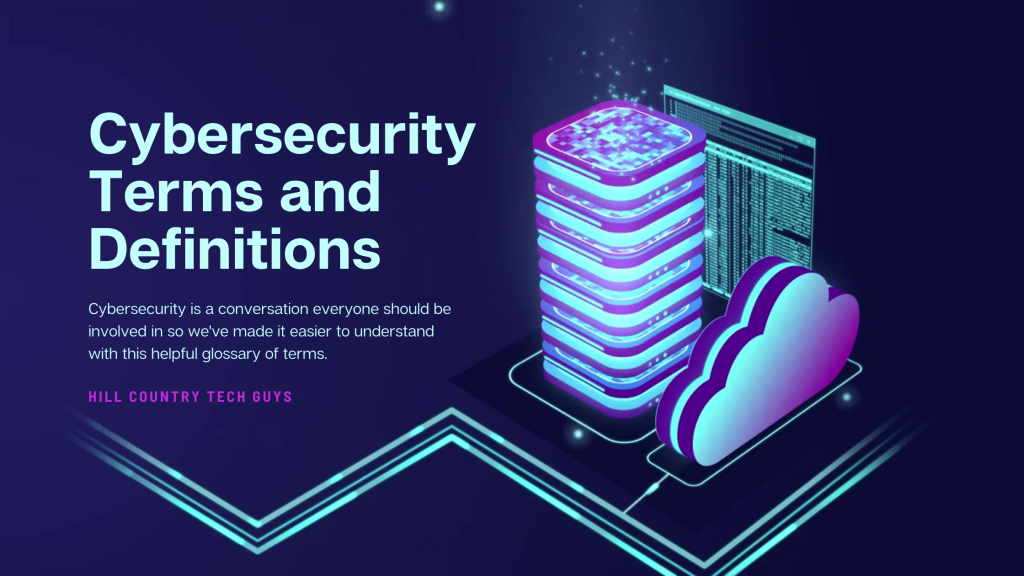Why Small Businesses Need to Know Cybersecurity Terms
You don’t need to be an IT expert to protect your business. But having a basic understanding of cybersecurity terms helps you:
Make smarter decisions
Ask better questions
Work more effectively with your IT team or partner
When your MSP talks about things like EDR, patching, or cloud security, knowing what they mean helps you understand not just the what, but the why. And that leads to better outcomes for your business.
At Hill Country Tech Guys, we believe cybersecurity shouldn’t be confusing. If you’ve ever been overwhelmed by jargon or unsure what your IT provider was talking about, you’re not alone. That’s why we’ve created this plain-language cybersecurity glossary.
Cybersecurity Basics
Cybersecurity – Protecting systems, networks, and programs from digital attacks.
IT (Information Technology) – All technology-related infrastructure. Cybersecurity is just one part of IT.
MSP (Managed Service Provider) – A company (like Hill Country Tech Guys) that provides IT and cybersecurity services to businesses.
MFA (Multi-Factor Authentication) – A second step (like a text code or app confirmation) that secures accounts even if a password is stolen.
Firewall – A digital barrier that blocks unauthorized traffic.
Password Manager – A secure tool that stores login info (instead of sticky notes).
Cybersecurity Terms You’ll Hear at Work
Network – Your digital infrastructure: Wi-Fi, routers, connected devices.
Cloud Computing – Accessing software or data over the internet instead of local servers.
VPN – A secure internet connection, especially important for remote work.
Authentication – Proving you’re allowed to access a system or account.
Threats You Should Know
Phishing – Emails that trick you into sharing information.
Smishing – Phishing delivered by text message.
Ransomware – Malicious software that locks your data until a ransom is paid.
Spoofing – Pretending to be a trusted source to steal information.
Spyware – Software that secretly tracks your activity.
Clickjacking – Tricking you into clicking malicious links disguised as something safe.
Tools & Protection
Antivirus vs. MDR/EDR – Antivirus is reactive. MDR/EDR is proactive, advanced protection with human oversight.
Encryption – Scrambles data so only the right people can read it.
Patching – Updating software to fix vulnerabilities.
Mobile Device Management (MDM) – Keeps company phones, tablets, and laptops secure — even for remote staff.
Business & Compliance Lingo
Business Continuity – A plan to keep the business running during downtime.
SOC 2 – A compliance framework proving a provider can securely handle customer data.
HIPAA – Healthcare regulation that protects patient information.
NIST – A framework that helps companies manage and reduce cybersecurity risks.
Bonus Terms (For Extra Credit)
Penetration Testing – Ethical hacking to find weaknesses before criminals do.
Zero-Day – A newly discovered vulnerability that hasn’t been patched yet.
Access Control – Managing who can physically or digitally access systems.
Defensibility – Your ability to reduce or minimize the impact of a cyber incident.
Cybersecurity FAQs for Small Business
Q: What are the most important cybersecurity terms for small businesses to know?
A: Small businesses should understand basic terms like firewall, multi-factor authentication (MFA), phishing, ransomware, encryption, and patching. These terms cover the essentials of protecting data, accounts, and networks.
Q: Why should small business owners learn cybersecurity terms?
A: Knowing cybersecurity terms helps business owners make smarter IT decisions, ask better questions, and spot risks sooner. You don’t need to be an expert, but a little knowledge makes working with an IT partner much easier.
Q: What cybersecurity threats do small businesses face most often?
A: The most common threats include phishing emails, ransomware, weak passwords, and unpatched software. These are preventable with the right security tools and employee awareness.
Q: How can an MSP help small businesses with cybersecurity?
A: A Managed Service Provider (MSP) helps by monitoring systems, applying security updates, managing backups, and responding to threats. They simplify cybersecurity so businesses can stay secure without getting lost in technical jargon.
Knowledge Is Cyber Power
Cybersecurity doesn’t have to be overwhelming. Understanding these terms is the first step toward creating a safer, more secure workplace. You don’t need to know how to code, you just need to know enough to stay informed and make confident business decisions.
Want help securing your business without the jargon? Talk to Hill Country Tech Guys. We make IT simple, secure, and tailored to your business.




